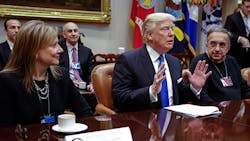President Donald Trump is returning to one of American labor’s last remaining strongholds with a message that could drive a wedge between long Democratic-leaning union leadership and members that are breaking ranks.
Trump will court United Auto Workers members in their backyard Wednesday, pledging to reopen a review of auto industry fuel economy standards. The president claims he’s lifting regulations that hinder jobs risks dividing rank-and-file union workers — who backed the Republican at rates last achieved by Ronald Reagan — against UAW leadership that worked with the Obama administration.
After criticizing union wages as too rich on the campaign trail, Trump invited labor groups to the White House within days of his arrival, withdrew the U.S. from the Trans-Pacific Partnership and pledged to renegotiate NAFTA. Those actions resonate with many working-class voters and position the billionaire president as a Republican with a shot at breaking Democrats’ hold on the UAW and the wider labor movement.
“Here’s a guy who wants to bring Detroit back to its greatness,” Paul Thayer, a UAW member and Fiat Chrysler Automobiles NV line worker who voted for Trump, said in an interview. “Let’s give him a chance.”
Trump has pledged regulatory relief for an auto industry that agreed to raise the average fuel economy of passenger cars to more than 50 miles per gallon by 2025. Barack Obama’s administration estimated it would cost the industry about $33 billion to meet the standards. Ford Motor Co. CEO Mark Fields has told Trump that about 1 million U.S. jobs are at risk if fuel-economy rules don’t align with market reality.
UAW President Dennis Williams, an Obama ally who endorsed Hillary Clinton, told reporters last month he doesn’t think the rules will hurt employment. “It actually enhances jobs if we do it the right way,” he said at the union’s headquarters in Detroit.
Williams does see some benefits of the new administration. He supported Trump’s move to pull the U.S. out of the TPP and his desire to reopen the North American Free Trade Agreement.
“He’s been the first president that has addressed this issue,” he said. “I’m going to give him kudos for it. We’ve been hollering about this for 20 years and he is the first president who has brought this up.”
On other issues — immigration policies, cabinet appointments and health care reform, to name a few — Trump remains diametrically opposed to UAW leadership, which “will not walk away from our core principles,” Williams said.
The UAW’s top brass also isn’t inclined to let Trump take credit for the investment plans that General Motors Co., Ford and Fiat Chrysler have announced during the early weeks of his presidency.
“We’ve been fighting this good fight for 50 years,” said UAW Vice President Jimmy Settles, who oversees Ford contract negotiations. “Then, all of the sudden, he’s the one getting American jobs in here.”
In October, Trump told a Detroit suburb crowd that the auto industry was “being sucked into Mexico” and took one of many shots at Ford for planning to build small cars south of the border. He ended up falling just eight percentage points short of Clinton among U.S. union households, the closest margin of defeat for a Republican presidential candidate since Reagan in 1984, an exit poll by Edison Media Research found in November.
Following Trump’s victory, Ford scrapped the $1.6 billion factory it was building in Mexico and announced a $700 million upgrade of a Michigan plant. GM has pledged $1 billion in U.S. investment toward new models and plant updates, and Fiat Chrysler has committed to spending the same amount toward making three new Jeeps in the U.S. and potentially a Ram pickup that’s being produced in Mexico.
Williams said all of those moves were in motion before Trump took office.
While Trump has suggested he’s bringing auto jobs back to the U.S., auto manufacturing employment has actually risen to 1.39 million last year from 1.23 million in 1978, according to Barry Hirsch, a Georgia State University economist.
Most jobs that have left Detroit haven’t gone overseas. They’ve shifted south to states willing to protect Japanese, German and Korean automakers from organized labor. As total employment rose, union membership in the U.S. auto industry fell to 17.9% last year from 67.4% in 1978, according to Hirsch.
Thayer, the UAW member who cast his ballot for Trump, keeps robots running at a Fiat Chrysler plant in Warren, Michigan. He’s thinking of running to be a full-time UAW bargainer, loves Trump’s crackdown on transgender rights and immigration, and makes no apology for his home answering machine message telling foreigners to hang up. Workers are so unhappy with self-serving union leaders, he said, they talk openly of de-certifying.
For now, UAW leaders are taking a wait-and-see attitude toward the president’s job-restoring braggadocio.
“It’s great Trump wants to bring back jobs, but my question is where?” said Mike Spencer, a UAW representative at Fiat Chrysler’s truck plant in Sterling Heights, Michigan. “If they come back to an area that’s not union-friendly, they’ll erode the wages and benefits we’ve built up for the middle class.”
By John Lippert, Josh Eidelson and David Welch
About the Author
Bloomberg
Licensed content from Bloomberg, copyright 2016.
